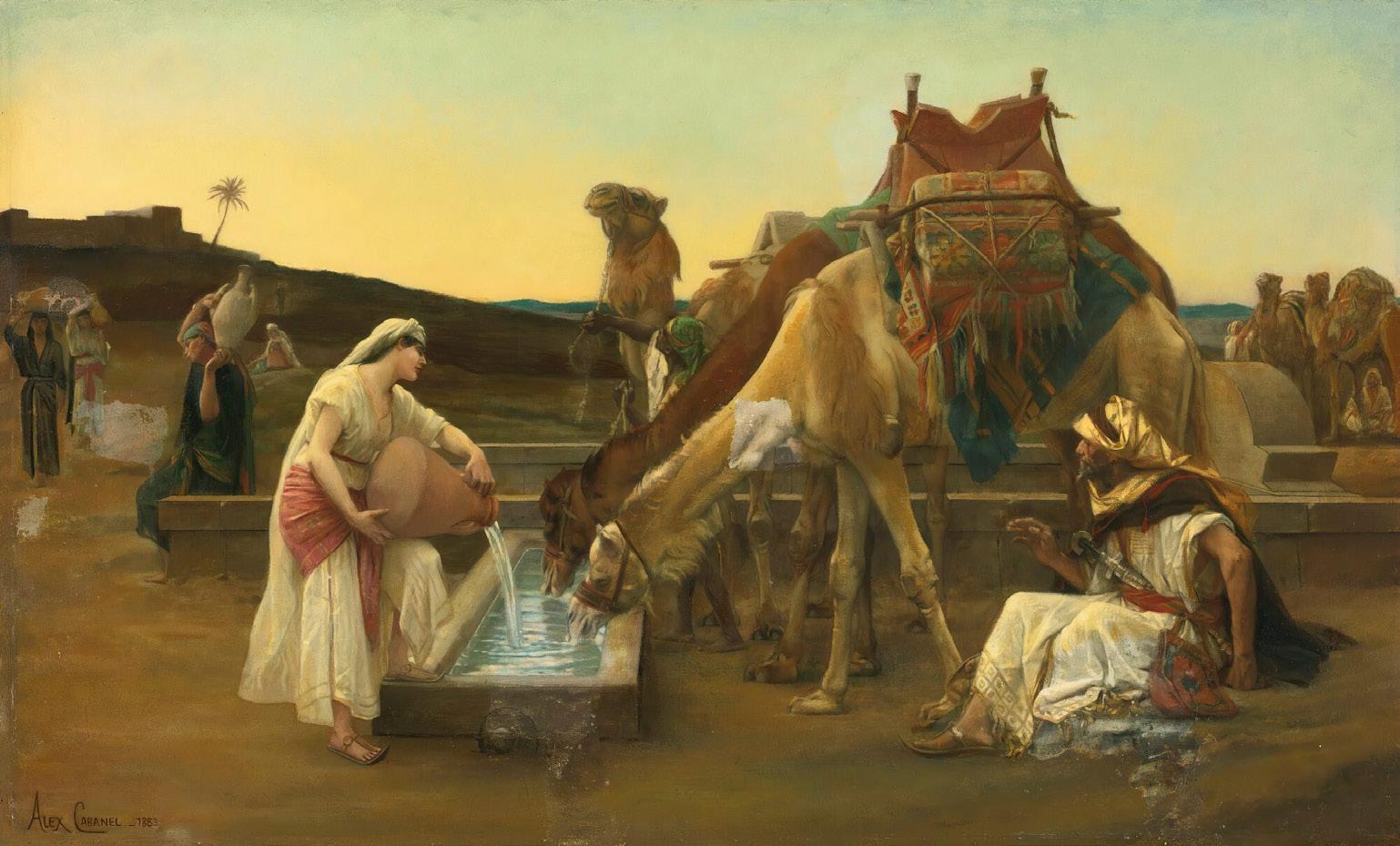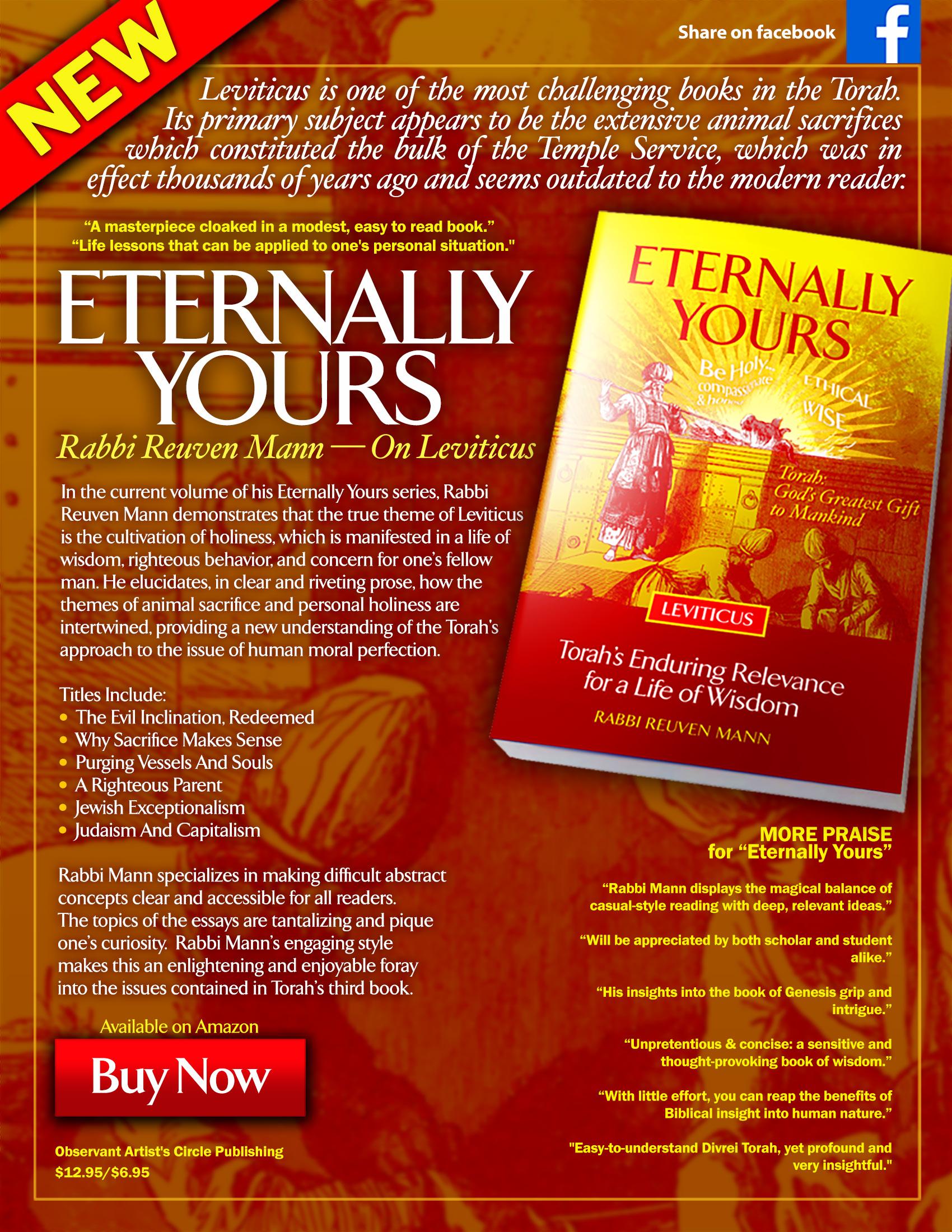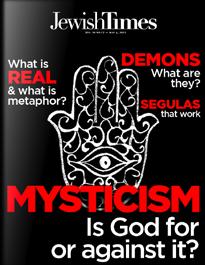Le ers
Psychology






















truly gives man pleasure: Torah’s brilliance. It is God’s approval—not man’s—that we were created to seek.
 MESORA
MESORA


READER: If one wants to be in the category of “shevet Levi” as Maimonides describes (Shemitah v’Yovel 13:13) must one be in kollel? Can one also work and be in that category?
Kahgan New York, NYRABBI: Kolel is unnecessary. Maimonides describes the criteria of “removing the yoke of calculations all others seek.” But this does not mean one abandons natural law and stops working. One must work. But his objective is not to maintain a financial status others envy. He labors for his needs,
and maximizes his remaining time in Torah study and in mitzvos. The amount of time is irrelevant, rather it is the attitude and devotion to Torah and not earthly concerns that renders him God’s “Holy of Holies,” whom God will be his eternal portion, and whom God will sustain with a su cient lot on Earth.



READER: I heard that after life, our souls go to live in God. Is this true? What would Rambam say to this?
 Turk Hill NJ, USA
Turk Hill NJ, USA
RABBI:“In” refers to space and location, God is not physical, so He occupies no location or space, and therefore nothing can exist “in” God. God is not here or there, as the rabbis teach, “God is the place of the world, and the world is not His place.” The rabbis mean that God is necessary for the world’s existence, just as a place is necessary for the location of anything. “The world is not God’s place” means God exists even without the world. He doesn’t need anything to exist. We barely know what a soul is, and we certainly know nothing about what God is, “For man cannot know Me while alive” (Exod. 33:20). And we know nothing about the afterlife, “No eye has seen it (afterlife) God, aside from You” (Isaiah 64:3). Therefore we cannot know what exists after life. But we know good people receive eternal reward. Additionally, and more primary, is that a soul is a creation, so it is something “other” than God. ■
READER: When blessing God before eating, I wonder why we refer to God as “king of the world” and not “creator of the world”? He created the food, so creator seems more fitting.
RABBI: Rabbi Israel Chait said, “creator”can imply that God created the world and then abandoned it. Whereas “king” refers to God’s sustained relationship with man. “King” refers to a greater involvement with man, and is therefore a greater praise of God. “The acquirer of heaven and Earth” (Gen. 14:19) means creation is God’s acquisition; he constantly relates to creation.
Maimonides writes as follows:
All blessings accordingly fall into three kinds; blessings recited when partaking of material enjoyments, blessings recited when fulfilling religious duties, and blessings of thanksgiving,
which have the character of praise, thanksgiving and supplication, and the purpose of which is that we should always have the Creator in mind and revere Him (Laws of Blessings 1:4)
The rabbis coined blessings to make man mindful of God throughout the day. They formulated a standard format: “Blessed are you God, our God, King of the world, who did such and such.” All blessings refer to God's kingship—which refers to governing man instead of a Creator—because creation is a one-time event, whereas governing refers to God’s continual guidance over man's a airs. Governing is a greater praise as God performs more, and a more accurate and inclusive blessing is preferred. It a complete praise, and we do not wish to compromise praises of God, so we might have a most complete understanding of Him, as far as humanly possible. So even though it is true that God “created” fruits, providing food comes under a greater and more impressive category of continually governing man throughout time.
READER: I see your point. However I'm still struggling to get the idea of creation being inferior to governing man. Mainly because of the idea you have espoused before that the natural laws governing the world were embedded in creation
RABBI: Yes, there are natural laws that govern Earth. But there are other laws of providence that govern man, and if he deserves food. This additional providence is more inclusive of God's greatness than natural law alone. Thus, blessing God not only as Creator, but as governor is a greater praise.
READER: I see. I remember one shiur, I don’t remember by who, about the Jews in the desert wanting to go back to Egypt. The gist of the shiur as I understood it was that Jews saw that Egypt was naturally blessed with fertile land and Nile water. Contrast that with the land of Israel which is always under God's providence, and would yield its produce if the Jews deserved it, but could be harsh if their level dropped. Naturally, man prefers the predictable Egypt (though chance disasters do happen now and then) to the demanding Israel. Since God stated that the land of Israel would continually be under His providence, I guess one can infer that it is higher level to be under continual providence than natural law?
RABBI: Yes, man benefits more when guided by God’s instruction through reward and punishment. But this addresses a di erent point of “human benefit.” What we are focused on in your original question is which praise of God is greater, “Creator” or “King.” We concluded that king refers to more than creator. “Creator” can imply God made earth and then abandoned it, whereas “King” refers to a constant providence over Earth and man.
 RABBI MOSHE BEN-CHAIM
RABBI MOSHE BEN-CHAIM
Abraham was already perfected; obviously God knew this. What gain then was served by God “testing” Abraham with many ordeals?
Tests or trials were not for Abraham’s benefit, nor for God. God’s purpose in testing Abraham was to teach the world man’s great potential (Rabbi Israel Chait explaining Maimon ides on Trials, “Pirkei Avos 5/6” pg 39). For God created man with great abilities: to engage his mind to observe and discov er…to uncover truths about creation. This includes knowledge of God’s will, physical sciences, psychology, philosophy, justice and morality. Abraham probed all God’s creations and discov ered God’s brilliance permeates all that exists. Abraham led a life of intellectual and moral perfection. Therefore, God record ed his perfections in Genesis.
But why does Bible document people? Why isn’t it simply a list of laws? Rabbi Israel Chait taught that although other philoso phies include principles found in Torah, they do not contain models of perfected humans’ lives. The stories of great individ uals educate us on the many facets of perfected human nature in interpersonal conduct, and in their intelligent considerations. These role models o er an opportunity to identify with them, to emulate them. Unlike Abraham and Sarah, it is di cult for most people to improve their character without a role model.
The stories of the patriarchs and matriarchs—who predated Torah—are God's lessons of how capable a human being is using his raw faculties—without books, prophecy or teach ers—to attain great character. For we see that Abraham and Sarah reached great levels of intelligence and moral perfection prior to receiving prophecy, while also amidst a world steeped in idolatry. Such great personalities reveal how perfect are God’s human creations; He created man with stupendous potential. Abraham, Sarah and the other matriarchs and patriarchs teach this by example.

Bible is therefore not a book of laws, but a system through which God o ers man the best direction to perfect himself. This system contains laws which are structured with great wisdom. This system also profiles portions of the lives of great individuals, and sinners. Laws o er us appreciation for God’s great intelligence and morality, guiding us to truths, and to peaceful societies. Role models o er us inspiration for meeting the challenge to adhere to God’s will in daily life.
Being Jewish means to meticulously follow God’s Biblical will, for our own good. Great individuals arrived at God’s will without Bible, as they actually form Bible. They are eternal models to mankind of the great raw potential we each possess. But few people in a generation attain such character, explain ing the need for Bible to help guide most of mankind.
Follow our role models Abraham and Sarah who dedicated their lives to teaching others about God and His will for mankind (Gen. 12:8, 13:4, 21:33, 26:26, Rashi Gen. 12:5). Each of us can influence others in some measure. Think about who you can help, and strive to do so. This is truly what it means to be a Jew, explaining why God highlights personalities and formed His nation from Abraham. ■

This week’s Parsha, Chayei Sarah, begins on a sad note as we read about the death of our first Matriarch, Sarah Imainu. She had left her family and homeland and joined Avraham in his travels and tribulations. She was fully engaged in the great outreach movement which brought so many people under the wings of the Shechinah. At her initiative, Avraham took Hagar as a wife in order to produce a worthy spiritual heir. With the best of intentions, however, that plan didn’t work out. And then the great miracle which brought joy and laughter to all decent people occurred. Sarah was ninety years old when she bore Yitzchak and fully able to nurse him until his time to be weaned.
Sarah died at the age of one hundred and twenty-seven, which means that she got to enjoy thirty-seven years with her precious son. Thus, she was there when he was little and in his teenage and adult years.
It wasn’t long after her death that a Shidduch (match) was found for Yitzchak, and he got married. One can’t help but wonder what a great Simcha (happiness) that would have been for Sarah to attend. Was it absolutely necessary for her to die before her son got married? Rashi cites a Midrash which seeks to explain the juxtaposition between Sarah’s death and the Akeida (binding of Yitzchak for sacrifice). How so? When an angel came forward and told Sarah how close her son had come to dying, she went into shock and expired.

According to this Midrash, one can assume that had the angel refrained from speaking, Sarah would have been alive and well and danced at Yitzchak’s wedding. Of course, we don’t know what motivated the angel to convey such tidings to Sarah. But this story contains an important lesson for us. Think before you blurt things out. There is a great desire to be the one who reveals the latest news–but not everyone can handle distress ing reports.
Certain announcements can have a “shock e ect” and while many people can absorb them unharmed, yet there are others who may have “pre-existing conditions” for whom the sudden jolt can be dangerous. We need to bear that in mind and always be sensitive to the condition of others.
The death of Sarah had an impact on her immediate family and society at large. The people of the area deemed it an honor to have this great Tzadeket (righteous one) buried among them. It would seem that her passing precipitated the search for a wife
for Yitzchak. Avraham’s trusted servant, Eliezer, discovered this beautiful girl at the watering holes caring for the sheep of her father. Could this be the one he had prayed for?
In order to find out, he devised a test. “Let it be that the maiden to whom I shall say, ‘Please tip over your jug, so I may drink’; and who replies, ‘Drink and I will even water your camels,’ her will You have designated for your servant, for Yitzchak; and may I know through her that You have done kindness with my master. (Bereishit 24:14)” And this is precisely what happened, and Eliezer considered the girl to be a true disciple of Sarah in wisdom, compassion and Gemillut Chasadim (assisting people in need).
The Torah describes the marriage. “And Yitzchak brought her into the tent of Sarah his mother; he married Rivka, and she became his wife, and he loved her, and thus was Yitzchak consoled after his mother. (Bereishit 24:67)”
This verse seems to be repetitive, for after saying “he married her” it is completely unnec essary to say that “she became his wife”. But the Torah is communicating an important idea here. A woman does not become a wife by the mere act of marrying her. From a technical perspective yes, but from an existential stand point no.
Being a wife or husband depicts a certain type of living relationship. The marriage ceremony establishes the legal framework, but the manner in which each party relates to the other is determinative. The Torah is telling us that after the wedding each party treated and related to the other as a caring, respectful and attentive spouse.



And Yitzchak discovered in Rivka the great virtues he had experienced in his mother, and this was a source of extreme comfort. May we attain the level of love and tranquility which marked the marriages of our illustrious forefa thers.




 RABBI MOSHE BEN-CHAIM
RABBI MOSHE BEN-CHAIM
ow does conflicted man behave? How does he justify his sin? As Rabbi Israel Chait taught, Torah di ers from other philosophies by presenting role models, not by merely identifying abstract truths. We might apply this also to models of sinners. Role models surpass abstract principles, as we are more impacted by peoples’ practices: their concrete actions with which we identify. Identification is a great tool to motivate us as our psychological faculties include a self-image, and we create an acceptable self-image when we copy those whom we admire. Seeing role models in action o ers us a most clear personality to copy. Human examples improve us, steering us away from evil and towards goodness, far better than what dry, abstract principles merely describe in text.
The story of Lot and the angels is one such role model presentation. The deeper psycho logical phenomena and dynamics are cloaked in God’s scripted story, with very subtle clues, the details of which teach many nuances of human nature. The purpose of concealing psychological principles is because human emotions and psychological faculties are not tangible or observable, and many individuals reject what is not observable. They are not on the level to accept such truths, so God hides the lessons for those who can appreciate psychology and philosophical perfection, and know how to decipher Torah. Let’s review this startling Torah story:
The two angels arrived in Sodom in the evening, as Lot was sitting in the gate of Sodom. When Lot saw them, he rose to greet them and, bowing low with his face to the ground, he said, “Please, my lords, turn aside to your servant’s house to spend the night, and bathe your feet; then you may be on your way early.” But they said, “No, we will spend the night in the square.” But he pressed them strongly, so they turned his way and entered his house. He prepared a feast for them and baked unleavened bread, and they ate. They had not yet lain down, when the townspeople, the men of Sodom, young and old—all the people from everywhere—gathered about the house. And they shouted to Lot and said to him, “Where are the men who came to you tonight? Bring them out to us, that we may be intimate with them.” So Lot went out to them to the entrance, shut the door behind him, and said, “I beg you, my friends, do not commit such a wrong. Look, I have two daughters who have not known a man. Let me bring them out to you, and you may do to them as you please; but do not do anything to these men, since they have come under the
shelter of my roof.” But they said, “Come here,” and one said, “You came here to dwell, and will you now judge [us]? Now we will deal worse with you than with them.” And they pressed hard against the person of Lot, and moved forward to break the door. But the angels stretched out their hands and pulled Lot into the house with them, and shut the door. And the people who were at the entrance of the house, young and old, they struck with blindness, so that they were helpless to find the entrance. (Gen. 19:1-11)
Maimonides teaches: “We have already shown that the appearance or speech of an angel mentioned in scripture took place in a vision or dream” (Guide, book II, chap. xli). Following Maimonides’ understanding that Torah stories including angels must be understood in a non-literal sense [angels are not physical], I suggest below in this essay the following interpretation. Support for Maimon ides’ view is found in the following implications:
• Lot o ers his daughters’ for sexual pleasure—to an entire city—while sheltering complete strangers. This is extremely peculiar, that greater mercy is expressed for strangers than for one’s daughters, whom the father treats cruelly as harlots.
• The practically impossible sudden gather ing of literally all Sodomites—from “youths to elders”—from “all corners of Sodom” is not credible, if literal. News does not spread that fast, nor do all society’s members act identical ly.
• The Sodomite’s relentless search for Lot’s door…even after they were blinded.
• The very phenomenon of blinding the Sodomites.
• The angels’ initial rejection of Lot’s hospitali ty, when they were in fact in Sodom to save him, is contrary to their goal.
As Torah is written with complete precision and no redundancy, where many details share many lessons, we wonder about the focus 11 times on Lot’s “house,” “door,” “roof,” and “entrance.” Of what instruction are these details about Lot’s home? And this verse captures our attention: “You came here to dwell, and will you now judge us? Now we will deal worse with you than with them.”
This event is a metaphor. Of course, Lot was literally saved and Sodom was destroyed, as stated later: “Thus it was that, when God destroyed the cities of the plain and annihilated the cities where Lot dwelt, God was mindful of
Abraham and removed Lot from the midst of the upheaval” (Gen. 19:29). However, this highly detailed account of the angels, the Sodomites, and Lot and his “home” are unnecessary, if we are only meant to learn of Lot’s salvation and Sodom’s destruction. What then do all these details teach?
This entire metaphor depicts Lot’s personali ty. God is once again instructing mankind on how the psyche operates, to guard from poor qualities and cleave to righteousness. Let’s decipher the verses one by one:
But they said, “No, we will spend the night in the square.” But he pressed them strongly, so they turned his way and entered his house
Lot must coerce the angels to enter his home means that Lot must “force” proper morality upon himself. The angels’ reluctance to enter Lot’s home refers to Lot’s reluctance to incorporate complete justice into his life. Lot chose to live in Sodom, a corrupt society bent on extreme promiscuity; he was attracted to immorality. Nonetheless, Lot followed some morality: he provided hospitality. Why? This was due to his conflict: he craved lusts but learned morality and kindness from Abraham. Lot was conflicted. Lot’s solution was to assuage his guilt by performing some token act of kindness [towards these angels]. Support for Lot’s resistance to act with full kindness was his meager “feast” (only dry matzos) served to the angels, while Abraham served the angels a lavish feast of meat, milk and cake, not meager matzos.
They had not yet lain down, when the townspeople, the men of Sodom, young and old—all the people from every where—gathered about the house. And they shouted to Lot and said to him, “Where are the men who came to you tonight? Bring them out to us, that we may be intimate with them.”
Suddenly after the angels entered—“They had not yet lain down”—the mob descended upon Lot’s house—every citizen. As mentioned, it is impossible that the news spread immediately, and that “all” Sodomites arrived. But metaphorically speaking, this means that as soon as Lot performed some proper act of hospitality, his corrupt emotions (represented by the Sodomites) immediately conflicted with his token act of morality.
So Lot went out to them to the entrance, shut the door behind him.
This refers to Lot’s dichotomy. His guilt demanded that he retain some good self-im age, and “closing the door” means this: Lot wished to compartmentalize his small measure of morality, to preserve an acceptable self-image. This required a “safe compartment” in his mind (his home in this metaphor) that he kept o -limits to immorality. Lot felt justified in retaining his lewd character, through some just token act (hosting the men), thereby retaining an acceptable self-image. He could even tolerate a separate act of giving his daughters to the Sodomites for heterosexuality, but he would not cross the line of homosexuality with those angels, which secured for him a sense of justice. This explains Lot’s words, “But do not do anything to these men, since they have come under the shelter of my roof.” In this metaphor, Lot’s home represents a part of himself which he required to remain untainted, so as to view himself in some favorable light.

God refers to Lot’s home 11 times! That’s excessive, unless God wishes to emphasize the significance of this psychological phenom enon: Lot’s home represents a “place” in his mind…a degree of abstinence from sin, through which he justifies all his other lusts. The conflicted man will dichotomize his values and actions to preserve his self-image. Every person musty feel he acts correctly. Lot “forces” good angels into his home, but prevents entrance by sinners into this compart ment of his behavior. In other words, Lot forces some morality into his life. The numerous instances of Lot’s home intend to call our attention to the core of the metaphor: a “moral compartment of his character.” That compart ment is Lot’s self-image. Lot’s “home” is the compartment of himself engaging in a just morality.
Lot o ering his daughters to the Sodomites displays his corrupt dichotomy, his absurd sense of justice…as the following conveys…

Lot said, “I have two daughters who have not known a man. Let me bring them out to you, and you may do to them as you please; but do not do anything to these men, since they have come under the shelter of my roof.” The Sodomites replied: “You came here to dwell, and will you now judge [us]? Now we will deal worse with you than with them.”
Torah identifies Lot’s dichotomy and teaches a primary lesson: indecision corrupts. Lot moves to Sodom, yet he tells the Sodomites to restrain their sin, thereby Lot straddles both sides of the fence: he has not chosen any one lifestyle. A person who cannot choose is more susceptible to corruption, as he has no firm grip on any philosophy. His mind is incapacitat ed. This uncommitted mind state allows him to accept any corrupt act, for his choices are not rooted in any opinion:
You came here to dwell [you value lusts], and will you now judge us [you also value righteousness]? Now we will deal worse with you than with them”.
This is Torah’s method of communicating Lot’s precise flaw, and danger. Similarly we read:
Elijah approached all the people and said, “How long will you keep hopping between two opinions? If the Lord is God, follow Him; and if it is Baal…follow him!” But the people answered him not a word (I Kings 18:21).
Elijah criticized the Jews for this same error, and the people could not respond: their minds were disengaged. Astonishingly, Elijah said that following Baal alone would be preferable to following it together with following God. How so? He meant that at least when following Baal alone, one has made a decision, even though it is wrong. Choosing wrongly is preferable to no choice at all, for at least the mind is engaged, and then can be taught its error. But a disengaged mind cannot learn. So too regarding Lot: “You came here to dwell, and will you now judge [us]? Now we will deal worse with you than with them.” Lot’s conflicting views rendered him susceptible to great harm.
Rabbi Israel Chait said as follows:
A psychologist once said that when analyzing a person, all parts of the personality must be scrutinized. He gave the following analogy: If the police said they would patrol all places except for one town, surely all the criminals would relocate to that unpatroled town. The same is true with the human personality. If all but one part of the psyche is scrutinized, that one area is where one will vent all his emotions. (Pirkei Avos, chap. 4, pg 237)
Why must we read 11 times about the “house,” “entrance,” and that he closed the “door”? Here is the key.

Certainly, as only one part of Lot’s mind was scrutinized, all other emotional areas sought satisfaction, expressed by “The townspeople, the men of Sodom, young and old—all the people from everywhere—gathered about the house.” This is a metaphor for all of Lot’s other emotions—“young and old—all the people from everywhere”—which threatened him as he justified himself in one area. When we feel we are righteous with one act, we feel we need not scrutinize any other aspect of our personalities. This gives reign to all the remaining emotions. The Crusades and Nazis could perpetrate so much evil because they justified their religion and warped morality.

Now we will deal worse with you than with them.
Lot justified the rest of his lusts due to acting properly in one area; his overall self-image was thereby validated by o ering hospitality. Now his remaining emotions would deal worse with him: “And they pressed hard against the person of Lot, and moved forward to break the door.”
Notice the identical word: Lot initially “pressed” (vayiftzar) the angels, and then the Sodomites (Lot’s other lusts) “pressed” (vayiftzaru) Lot. Meaning, that Lot had to force morality upon himself (morality towards angels), this revealed his lustful leanings: his emotions (Sodomites) bearing down on him to the point that he would become fully corrupted. His instincts were about to “break through the door,” to obliterate that small amount of good Lot attempted to keep preserved in his heart, “behind the door.” That Lot required force to show hospitality means that his nature strongly opposed it, and flowed towards lusts. The same word is used as Torah describes 2 reactions from the same lustful urges.
But the angels stretched out their hands and pulled Lot into the house with them, and shut the door. And the people who were at the entrance of the house, young and old, they struck with blindness, so that they were helpless to find the entrance.
The angels referring to absolute justice, cannot coexist with immorality, so they stretched their hands alone “outside” the door. But they did not intermingle in the same area as the Sodomites (good and evil do not coexist). God saved Lot, expressed as the angels saving him. Lot could not save himself. Perhaps Lot’s salvation was not so much due to his level, but due to a stain on Abraham’s reputation. Had Abraham’s nephew Lot been destroyed, this would tarnish Abraham’s identity and success at spreading monotheism. Thus, we read “Thus it was that, when God destroyed the cities of the plain and annihilated the cities where Lot dwelt, God was mindful of Abraham and removed Lot from the midst of the upheaval” (Gen. 19:29).
That the Sodomites still sought to enter Lot’s home after being stricken with blindness further supports this story as being a metaphor.
This story shares a lesson in psychology: how conflicted man attempts to engage in immorality while retaining some compartment in his mind of a morally-correct self-image. But such a compromise eventually fails. “God appeared to Abram and said to him, ‘I am El Shaddai, walk in My ways and be complete’” (Gen. 17:1). Following God requires “complete ness”; partial Torah adherence (Lot) indicates a corruption and leads to failure. It is also notable that this verse (Gen. 17:1) refers to God’s command to Abram of circumcision, a moderation of the sexual drive, in contrast to Lot’s philosophy of indulging it.
This Torah story leaves us with a deeper appreciation for God, as He shares such detailed psychological knowledge with mankind. Torah means “guide,” and to guide us towards perfection, God o ers us guidance not only in intellectual matters, but also in studying and managing our emotions through human examples. ■
Subscribe by emailing: Join@Mesora.org







and readers’ letters.
Enjoy all 624 back issues free: www.Mesora.org


